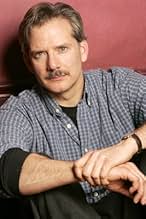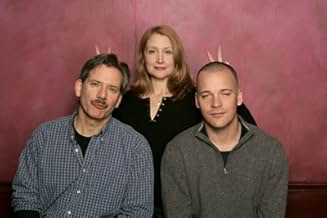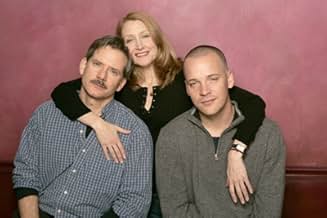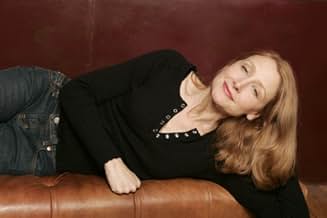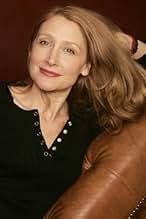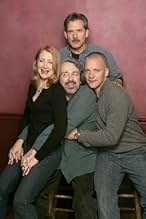AVALIAÇÃO DA IMDb
6,4/10
2,5 mil
SUA AVALIAÇÃO
Adicionar um enredo no seu idiomaA grief-stricken screenwriter unknowingly enters a three-way relationship with a woman and her film executive husband - to chilling results.A grief-stricken screenwriter unknowingly enters a three-way relationship with a woman and her film executive husband - to chilling results.A grief-stricken screenwriter unknowingly enters a three-way relationship with a woman and her film executive husband - to chilling results.
- Prêmios
- 1 vitória e 2 indicações no total
Craig Hamrick
- Party Guest
- (narração)
- (não creditado)
Jason-Shane Scott
- Robert's Masseuse
- (não creditado)
Bridgetta Tomarchio
- Female Guest
- (não creditado)
Avaliações em destaque
Somehow, this movie managed to hold my interest despite the fact that I never really cared about the characters or what was going to happen to them next. It's not a love story. Not a very good relationship tale. Not a mystery or thriller. Instead, Dying Gaul is a modern day Greek tragedy that uses Hollywood and homosexuality as simply vehicles to generate interest.
This is Craig Lucas' first time in the director's chair. He wrote The Secret Lives of Dentists (previously at Sundance, starring Patricia Clarkson). The movies tackle the same themes---the value and meaning of marriage, the impact of dalliances, the complexities of finding happiness and satisfaction without veering from tradition. But Dying Gaul comes at it with a different orientation, and even outcome.
Patricia Clarkson is always excellent, but here she shows a little evil in her character, which is outside her normal range. Unfortunately, the rest of the cast comes off as wooden, certainly uninspired. Pay attention, because there are liberal doses of philosophy in the form of quotes and counsel. But the real tragedy here is the lack of a meaningful story or compelling characters.
This is Craig Lucas' first time in the director's chair. He wrote The Secret Lives of Dentists (previously at Sundance, starring Patricia Clarkson). The movies tackle the same themes---the value and meaning of marriage, the impact of dalliances, the complexities of finding happiness and satisfaction without veering from tradition. But Dying Gaul comes at it with a different orientation, and even outcome.
Patricia Clarkson is always excellent, but here she shows a little evil in her character, which is outside her normal range. Unfortunately, the rest of the cast comes off as wooden, certainly uninspired. Pay attention, because there are liberal doses of philosophy in the form of quotes and counsel. But the real tragedy here is the lack of a meaningful story or compelling characters.
I just saw this at the Seattle Film Festival, Peter Saarsgard was there to answer questions. The movie is extremely watchable for the first half of the way through, is built on a fascinating premise with interesting characters (a bisexual movie producer and his wife who reside in a Lifestyles of the Rich And Famous type beachside modern mansion, a young gay writer whose lover has died of AIDS), and builds to a pitch of extreme suspense. After that, however, the plot stumbles and the film's conclusion turns on a series of unbelievable events. I thought since the movie was based on a play, the plot would be clear, but it's almost as if the movie version was forced to cut out some important sequences, as there is never quite enough information about 1) how the woman obtains all her inside information on the writer, 2) how the writer's ex-wife was related to the characters and 3) most importantly, what happens to the characters at the end of the movie.
I went into the bathroom after the movie and joined a lineup of women who were also asking each, "What exactly happened there?" --- when it's not clear it's a sign of unclear movie-making.
I went into the bathroom after the movie and joined a lineup of women who were also asking each, "What exactly happened there?" --- when it's not clear it's a sign of unclear movie-making.
Suppose you had intimate knowledge about someone, and that someone did not know that you knew. How would you use that knowledge? Or would you? This issue is the undercurrent that carries the film's plot, like a fast moving stream, over a cliff, to a swirling, uncontrollable emotional vortex that changes people's lives forever.
Set in modern Los Angeles, a grieving gay screenwriter named Robert (Peter Sarsgaard) meets with Jeffrey (Campbell Scott), a wealthy film producer, to talk about Robert's script "The Dying Gaul", a tribute to his deceased lover and soul mate. Jeffrey invites Robert to his mansion by the ocean to meet his wife Elaine (Patricia Clarkson), who reads Robert's script and loves it. Over time, Robert and Elaine become friends, which sets up a triangular relationship that careens out of control when the anonymity of internet chat rooms provides cover for the discovery of secrets.
Artsy in tone and philosophy, the film exudes New Age dialogue, with conversation about Buddhist Karma, "the middle way", enlightenment, and deadly plant roots. The film's production design is chic. And while the color cinematography is mostly conventional, sometimes it is beautifully stylistic. I really liked those stark human silhouettes against that orange screen. The film's score, which connotes New Age spiritualism, is terrific.
Acting of the three leads is quite good. Patricia Clarkson is great as she sits in front of a computer monitor and, without speaking, displays myriad emotions through her facial expressions alone.
The chat room scenes are creative and emotionally potent, amid magnified keyboard clicking sounds. The back and forth exchange here is unusual, and striking in that it is meaningless when taken out of context, but highly enlightening when considered in relation to the film's plot, as this sample shows: "Hello"; "I hear clicking"; "I'm still here"; "Are you still there?"; "Yes"; "You sound really distracted"; "Yeah today"; "When?" "I'm sorry"; "No, I'm all yours"; "Are mine what?"; "No"; "Yes"; "Meaning?"; "I'm all yours now".
The film's screenplay does contain a rather obvious plot hole. And a couple of scenes involving Robert's son and former wife are too tangential to the story's trajectory. But these are minor issues.
"The Dying Gaul" may seem artistically or philosophically pretentious to some viewers. But I really liked it. Quite aside from the wonderful performances and the chic production values, the film's story has thematic depth, a quality lacking in most mainstream Hollywood films.
Set in modern Los Angeles, a grieving gay screenwriter named Robert (Peter Sarsgaard) meets with Jeffrey (Campbell Scott), a wealthy film producer, to talk about Robert's script "The Dying Gaul", a tribute to his deceased lover and soul mate. Jeffrey invites Robert to his mansion by the ocean to meet his wife Elaine (Patricia Clarkson), who reads Robert's script and loves it. Over time, Robert and Elaine become friends, which sets up a triangular relationship that careens out of control when the anonymity of internet chat rooms provides cover for the discovery of secrets.
Artsy in tone and philosophy, the film exudes New Age dialogue, with conversation about Buddhist Karma, "the middle way", enlightenment, and deadly plant roots. The film's production design is chic. And while the color cinematography is mostly conventional, sometimes it is beautifully stylistic. I really liked those stark human silhouettes against that orange screen. The film's score, which connotes New Age spiritualism, is terrific.
Acting of the three leads is quite good. Patricia Clarkson is great as she sits in front of a computer monitor and, without speaking, displays myriad emotions through her facial expressions alone.
The chat room scenes are creative and emotionally potent, amid magnified keyboard clicking sounds. The back and forth exchange here is unusual, and striking in that it is meaningless when taken out of context, but highly enlightening when considered in relation to the film's plot, as this sample shows: "Hello"; "I hear clicking"; "I'm still here"; "Are you still there?"; "Yes"; "You sound really distracted"; "Yeah today"; "When?" "I'm sorry"; "No, I'm all yours"; "Are mine what?"; "No"; "Yes"; "Meaning?"; "I'm all yours now".
The film's screenplay does contain a rather obvious plot hole. And a couple of scenes involving Robert's son and former wife are too tangential to the story's trajectory. But these are minor issues.
"The Dying Gaul" may seem artistically or philosophically pretentious to some viewers. But I really liked it. Quite aside from the wonderful performances and the chic production values, the film's story has thematic depth, a quality lacking in most mainstream Hollywood films.
Hollywood is always a sinister setting, even for a comedy and "The Dying Gaul" is no exception. I don't intend to divulge the ins and outs of the story because that should be your job, but I feel compelled to talk about it because it kind of stacked all over me like some kind of alien jelly. I always loved Campbell Scott and I suspect I always will. He plays the devil - The "I'll give you a million bucks if you abandon completely yourself, your principles, your loyalties" - kind of devil - He is married to the splendid Patricia Clarkson ( part Meryl Streep part Wayland Flower's Madame) and the object of his temptation is Peter Sarsgaard, one of the best creepiest actors ever to appear on film. It may be a personal thing but he gives me the willies. The film is an uncomfortable journey through a strangely familiar landscape that becomes darker and darker. I will take my chances and recommend it.
I enjoyed this film, up to a point- and that point was almost exactly the half way mark, where the writer director chose to go the maudlin implausible route instead of sticking with what he had, which was wonderful.
To have three characters in conflict and resolve it without any fancy plot device would have been truly courageous, but sadly what started out so lovely descended into melodrama and tedium.
That being said, Craig Lucas is clearly a talent to watch, he did a marvelous job with the actors- particularly Peter Skaarsgard, who does wonderful work, and the script is smart and even touching in places.
Campbell Scott seemed miscast to me, wooden and distant at places but oddly brazen in others. I can't imagine a married studio executive actually touching and almost kissing a writer ON THE LOT. I found myself imagining what other actors would have done with the role, never a good sign. But then again, he was one of the producers, so Mr. Lucas had his hands tied.
All in all, the first act was so promising that I was angered by the way Lucas decided to end it.
To have three characters in conflict and resolve it without any fancy plot device would have been truly courageous, but sadly what started out so lovely descended into melodrama and tedium.
That being said, Craig Lucas is clearly a talent to watch, he did a marvelous job with the actors- particularly Peter Skaarsgard, who does wonderful work, and the script is smart and even touching in places.
Campbell Scott seemed miscast to me, wooden and distant at places but oddly brazen in others. I can't imagine a married studio executive actually touching and almost kissing a writer ON THE LOT. I found myself imagining what other actors would have done with the role, never a good sign. But then again, he was one of the producers, so Mr. Lucas had his hands tied.
All in all, the first act was so promising that I was angered by the way Lucas decided to end it.
Você sabia?
- CuriosidadesThe film is dedicated to writer/director Craig Lucas's best friend, playwright Tony Kushner.
- ConexõesFeatured in 2006 Glitter Awards (2006)
Principais escolhas
Faça login para avaliar e ver a lista de recomendações personalizadas
- How long is The Dying Gaul?Fornecido pela Alexa
Detalhes
- Data de lançamento
- País de origem
- Central de atendimento oficial
- Idioma
- Também conhecido como
- The Dying Gaul
- Locações de filme
- Empresas de produção
- Consulte mais créditos da empresa na IMDbPro
Bilheteria
- Orçamento
- US$ 4.000.000 (estimativa)
- Faturamento bruto nos EUA e Canadá
- US$ 342.747
- Fim de semana de estreia nos EUA e Canadá
- US$ 53.944
- 6 de nov. de 2005
- Faturamento bruto mundial
- US$ 345.041
- Tempo de duração1 hora 32 minutos
- Cor
- Mixagem de som
- Proporção
- 1.85 : 1
Contribua para esta página
Sugerir uma alteração ou adicionar conteúdo ausente

Principal brecha
By what name was Triângulo Obsceno (2005) officially released in Canada in English?
Responda






